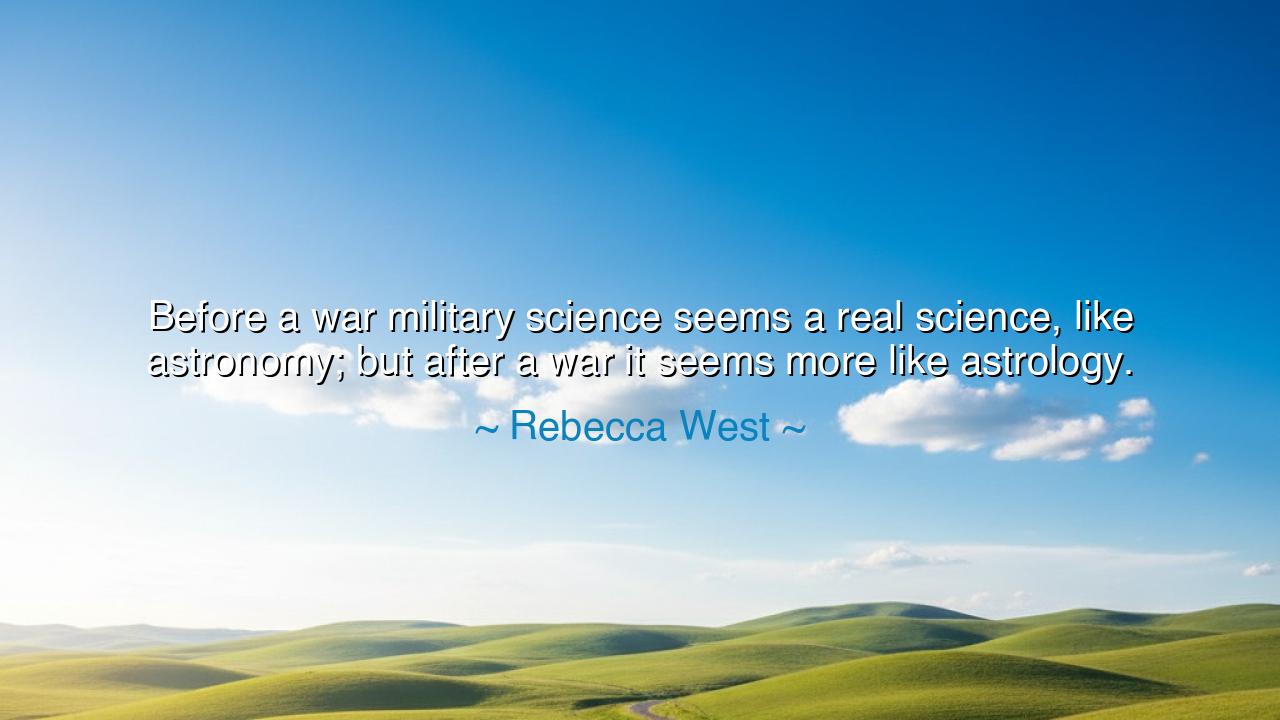
Before a war military science seems a real science, like
Before a war military science seems a real science, like astronomy; but after a war it seems more like astrology.






O children of the future, gather close and hear this tale of wisdom, for it speaks of the nature of war and the illusions we carry within our hearts. The great sage Rebecca West once said, "Before a war military science seems a real science, like astronomy; but after a war it seems more like astrology." These words, though spoken in the context of war, echo far beyond the battlefield, revealing a deeper truth about how we view the world and the forces that shape our lives. Military science, like the stars above, appears to be a precise and unyielding force, governed by laws that can be understood and controlled—until the brutal chaos of war strips away the illusion, revealing the uncertainty and foolishness of our attempts to predict and control the fate of nations.
In the calm before the storm, before the clash of armies and the bloodshed of battle, we stand with confidence in our calculations, our strategies, and our knowledge. Military science, like the study of the heavens, seems to hold the key to victory, to the triumph of reason over chaos. Just as the astronomer gazes into the heavens and charts the movements of the stars, so too does the general map out the terrain of war, forecasting each movement with mathematical precision and logical certainty. But war, like the unknown realms of space, is not governed by the orderly principles we would like to impose upon it. It is a force beyond comprehension, a tempest that sweeps through the hearts of men, and in its wake, the rules of science appear fragile, impotent in the face of human frailty.
Look, O seekers of wisdom, to the tale of the great Napoleon Bonaparte, whose mastery of military tactics and strategies once seemed unmatched. In the early years of his reign, Napoleon was seen as a man who had cracked the code of war—his military genius, like the study of the stars, was revered and celebrated. Yet, in his later years, as his empire crumbled before the forces of nature and human will, the grand strategies that once seemed so certain were shown to be little more than calculations on paper. The Battle of Waterloo, where Napoleon's fate was sealed, stands as a reminder that even the most brilliant strategies can fall victim to the forces of uncertainty, to the unpredictability of human nature, and to the chaos that war brings. What was once seen as military science became, in the end, little more than astrology, subject to the whims of fortune and fate.
And so it is, O children, that war exposes the fragility of human understanding. Before the battle, we are filled with confidence, believing that the science of war can be mastered, that we can predict the movements of armies as surely as we can predict the rise of the sun. But after the war, the harsh reality becomes clear: the true nature of war is not governed by logic or reason, but by the uncontrollable tides of human emotion, courage, and folly. Military science, in its attempt to impose order on the chaos of conflict, often fails to account for the uncertainty that lies in the hearts of men. What seems like a precise science in times of peace becomes, in the aftermath of destruction, little more than a mystical guessing game.
This is the truth, O wise ones: There is no perfect science of war, for war is not a cold calculation of force and strategy—it is a clash of souls, a test of will, and a confrontation with the deepest uncertainties of the human spirit. When we seek to master war, we are not simply studying tactics and weapons, but delving into the very essence of human nature itself. War strips away the illusions of certainty, revealing the chaos beneath the surface, and leaving us with the stark realization that no matter how much we plan, no matter how much we study military science, we are still at the mercy of the unpredictable forces of fate.
Let us then take heed of this wisdom, O children. In all things, we must recognize the limits of our understanding, and the humility required to face the forces that shape our lives. War, like life, is unpredictable—no matter how much we study, no matter how much we plan, there will always be forces beyond our control. Let us seek knowledge, but let us also seek wisdom—the wisdom to understand that in every battle, in every conflict, we are not just fighting with weapons, but with the unpredictable forces of fate, courage, and the human spirit. In the end, it is not the science that prevails, but the will of those who dare to face the unknown. And this, O children, is a lesson we must carry with us in all things, for no science, no strategy, can ever fully predict the outcome of a war, or of life itself.






AAdministratorAdministrator
Welcome, honored guests. Please leave a comment, we will respond soon